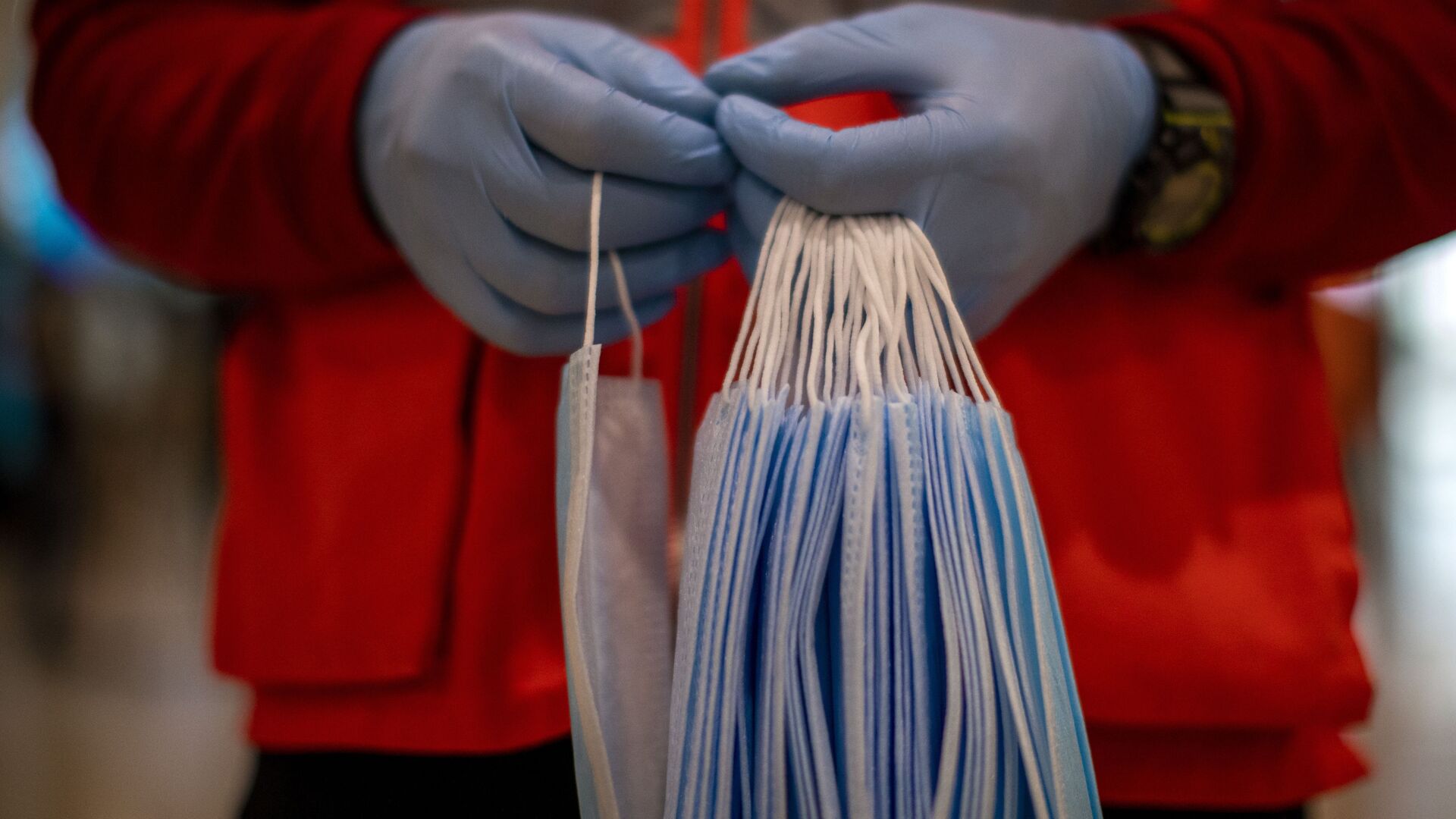https://sputnikglobe.com/20220310/biden-to-extend-federal-mask-rules-on-airlines-public-transport-until-18-april---reports-1093755393.html
Biden to Extend Federal Mask Rules on Airlines, Public Transport Until 18 April - Reports
Biden to Extend Federal Mask Rules on Airlines, Public Transport Until 18 April - Reports
Sputnik International
The Biden administration is expected on Thursday to extend the federal mask restrictions for all airlines and public transport in US states and territories... 10.03.2022, Sputnik International
2022-03-10T17:45+0000
2022-03-10T17:45+0000
2022-08-06T13:28+0000
mask mandate
us centers for disease control (cdc)
omicron strain
us
https://cdn1.img.sputnikglobe.com/img/107901/13/1079011336_0:320:3072:2048_1920x0_80_0_0_b808f41de088a881eb955bb7c93b4b56.jpg
The US Centers for Disease Control and Prevention (CDC) - the nation’s federal health agency - is expected to help government agencies create “a revised policy framework for when, and under what circumstances, masks should be required in the public transportation corridor."Masking has been required on all airlines and mass transport in the United States since 26 January 2021, when an executive order was issued just days after US President Joe Biden took office. His predecessor, Donald Trump, was sceptical as to the efficacy of mask-wearing during the first year of the COVID-19 pandemic despite the pleadings of the CDC and his White House COVID-19 task force.The mandate covers all buses, taxis and ride-sharing services - subways, trams, trains, ferries, and aircraft, as well as “the premises of transportation hubs” (ie, stations, airports, etc), although that was later amended to exclude outdoor hubs. The requirement exists for all workers and members of the public, regardless of vaccination status.“Travel contributes to interstate and international spread of COVID-19. Wearing masks that completely cover the mouth and nose reduces the spread of COVID-19. People who never develop symptoms (asymptomatic) or are not yet showing symptoms (pre-symptomatic) might not know that they are infected but can still spread COVID-19 to others. Masks also offer protection to the wearer,” it adds.Biden’s decision comes as COVID-19 cases in the US reach their lowest point since the summer of 2021, before the vaccine-penetrating Delta and later Omicron variants of the virus caused record outbreaks that killed hundreds of thousands in the United States and brought many plans for reopening to a halt.Many US states and territories have begun phasing out their indoor mask mandates in recent weeks as cases decline. On Thursday, the seven-day moving average of daily new cases in the US was just 37,879, down from a pandemic peak of 809,000 per day two months earlier, according to CDC data. Although the US has officially recorded a total of 79 million cases since the start of the pandemic in early 2020, recent studies suggest the true number might be almost twice as high.Let's stay in touch no matter what! Follow our Telegram channel to get all the latest news: https://t.me/sputniknewsus
Sputnik International
feedback@sputniknews.com
+74956456601
MIA „Rossiya Segodnya“
2022
Sputnik International
feedback@sputniknews.com
+74956456601
MIA „Rossiya Segodnya“
News
en_EN
Sputnik International
feedback@sputniknews.com
+74956456601
MIA „Rossiya Segodnya“
Sputnik International
feedback@sputniknews.com
+74956456601
MIA „Rossiya Segodnya“
mask mandate, us centers for disease control (cdc), omicron strain, us
mask mandate, us centers for disease control (cdc), omicron strain, us
Biden to Extend Federal Mask Rules on Airlines, Public Transport Until 18 April - Reports
17:45 GMT 10.03.2022 (Updated: 13:28 GMT 06.08.2022) The Biden administration is expected on Thursday to extend the federal mask restrictions for all airlines and public transport in US states and territories until 18 April. The decision comes just as most US states and cities are shedding their mask mandates for indoor dining and other areas.
The US Centers for Disease Control and Prevention (CDC) - the nation’s federal health agency - is expected to help government agencies create “a revised policy framework for when, and under what circumstances, masks should be required in the public transportation corridor."
Masking has been required on all airlines and mass transport in the United States since 26 January 2021, when
an executive order was issued just days after US President Joe Biden took office. His predecessor, Donald Trump, was sceptical as to the efficacy of mask-wearing during the first year of the COVID-19 pandemic despite the pleadings of the CDC and his White House COVID-19 task force.
The mandate covers all buses, taxis and ride-sharing services - subways, trams, trains, ferries, and aircraft, as well as “the premises of transportation hubs” (ie, stations, airports, etc), although that was later amended to exclude outdoor hubs. The requirement exists for all workers and members of the public, regardless of vaccination status.
“Traveling on public transportation increases a person’s risk of getting and spreading COVID-19 by bringing people in close contact with others, often for prolonged periods, and exposing them to frequently touched surfaces,” the
CDC’s website states.
“Travel contributes to interstate and international spread of COVID-19. Wearing masks that completely cover the mouth and nose reduces the spread of COVID-19. People who never develop symptoms (asymptomatic) or are not yet showing symptoms (pre-symptomatic) might not know that they are infected but can still spread COVID-19 to others. Masks also offer protection to the wearer,” it adds.
Biden’s decision comes as COVID-19 cases in the US reach their lowest point since the summer of 2021, before the vaccine-penetrating Delta and later Omicron variants of the virus caused record outbreaks that killed hundreds of thousands in the United States and brought many plans for reopening to a halt.
Many US states and territories have begun
phasing out their indoor mask mandates in recent weeks as cases decline. On Thursday, the seven-day moving average of daily new cases in the US was just 37,879, down from a pandemic peak of 809,000 per day two months earlier,
according to CDC data. Although the US has officially recorded a total of 79 million cases since the start of the pandemic in early 2020,
recent studies suggest the true number might be almost twice as high.
Let's stay in touch no matter what! Follow our Telegram channel to get all the latest news: https://t.me/sputniknewsus 
